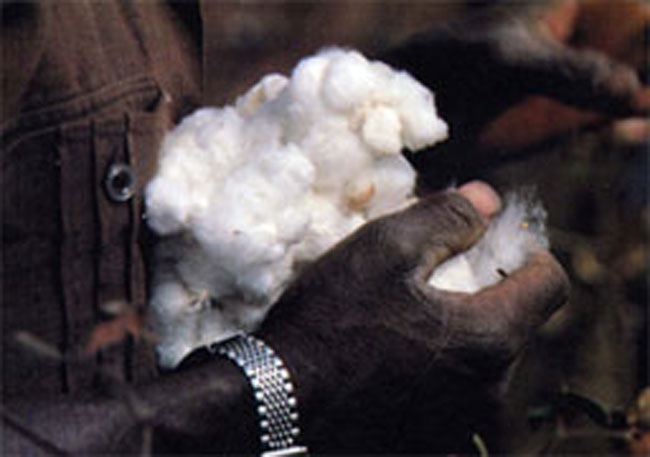La Guerre des cotons
-
Réalisé par Jean-Michel Rodrigo • Écrit par Jean-Michel Rodrigo
-
France • 2005 • 52 minutes • Digital vidéo • Couleur
- Réalisation :
Jean-Michel Rodrigo - Écriture :
Jean-Michel Rodrigo - Image :
Marina Paugam - Son :
Philippe Drouot
- Production (structure) :
Mécanos Productions - Coproduction :
Mécanos Productions - Participation :
AFD, CDG, CFSI (Comité Français pour la Solidarité Internationale), CNC, DAGRIS, Procirep, CNC - Ayant droit :
Mécanos Productions
- N° ISAN :
non renseigné
Résumé
D'un côté, vingt-cinq mille agriculteurs-industriels nord-américains qui possèdent chacun plusieurs milliers d'hectares de coton disposent de machinerie lourde et surtout du soutien d'un président dont le pouvoir à l'échelle internationale semble sans limite. De l'autre, des millions de paysans africains qui possèdent rarement plus d'un hectare, récoltent toujours à la main et gagnent au mieux un dollar par jour. En première position sur le marché mondial, un coton nord-américain qui coûte une fortune mais que trois milliards de subventions par an rendent particulièrement compétitif. En deuxième position, le coton africain d'une qualité exceptionnelle mais qui, ne bénéficiant d'aucun soutien financier, se voit à très court terme menacé de disparition par la concurrence. L'Organisation Mondiale du Commerce qui veille scrupuleusement à ce que les règles de la libre-concurrence soient respectées par tous semble ne pas avoir le pouvoir de faire plier Washington. La guerre des cotons traduit un tragique déséquilibre planétaire, mais elle est aussi porteuse d'avenir. Pour la première fois, des nations africaines parlent d'une seule voix. Soutenues par la France, elles sont obtenues gain de cause auprès de l'Union Européenne. Il leur reste à se faire entendre de la Chine émergente... et déjà toute puissante dans le textile
On a side, twenty-five thousand North-American farmer-industrialists who have each one several thousands of hectares of cotton, have of cumbersome machinery and especially the support of a President whose capacity on an international scale seems unbounded. Other, million African peasants who have seldom more than one hectare, always collect with the hand and again a dollar per day as well as possible. In first position on the world market, a North-American cotton which costs a fortune but that three billion subsidies per annum makes particularly competitive. In second position, the African cotton of an exceptional quality but which, profiting from no financial support, is seen in the very short term threatened of disappearance by competition. The World Organization of the trade which scrupulously takes care that the rules of free-competition are complied with by all seems not to have the capacity to make fold Washington. The war of cottons translates a tragedy unbalances planetary but is also carrying future. For the first time, African nations speak with one voice. Supported by France, they obtained profit of cause near the European Union. It remains to them to be made hear of emergent China... and already very powerful in the textile. To tell the truth, Africa does not have the choice. It should carry out battle until the end, in order to avoid chaos
Mot(s)-clé(s) thématique(s)
Sélections et distinctions
- 2007 • Sommet de Copenhague • Copenhague (Danemark) •
- 2007 • Festival international Agrifilms • Tunis (Tunisie) • Sélection
- 2006 • FIGRA - Festival International du Grand Reportage d'Actualité et du documentaire de société • Le Touquet (France) • Sélection
- 2006 • Terra Festival • Sainte Rose - Guadeloupe (France) • Prix Spécial du Jury
- 2005 • Prix Dauphine-Henri Tezenas du Montcel du Meilleur documentaire consacré à l'économie • Paris (France) •
Comment avoir accès au film ?
-
Édition DVD
- Il n'existe pas d'édition DVD à notre connaissance
-
Accès VOD
- Il n'existe pas d'accès en VOD à notre connaissance
- Diffusion non commerciale / Consultation


